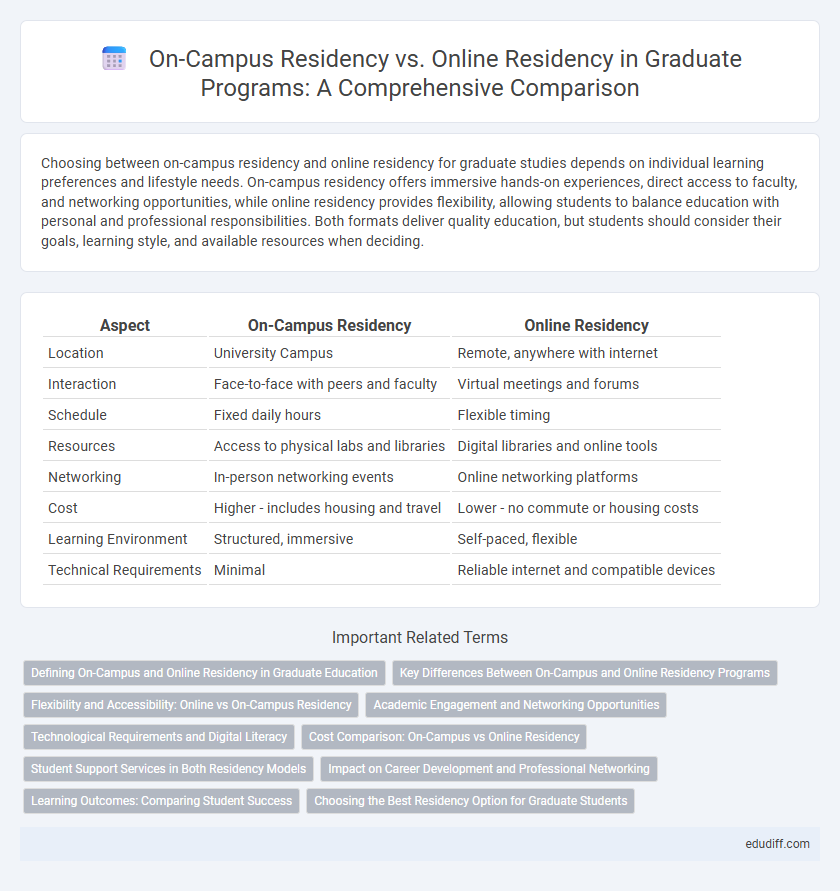Choosing between on-campus residency and online residency for graduate studies depends on individual learning preferences and lifestyle needs. On-campus residency offers immersive hands-on experiences, direct access to faculty, and networking opportunities, while online residency provides flexibility, allowing students to balance education with personal and professional responsibilities. Both formats deliver quality education, but students should consider their goals, learning style, and available resources when deciding.
Table of Comparison
| Aspect | On-Campus Residency | Online Residency |
|---|---|---|
| Location | University Campus | Remote, anywhere with internet |
| Interaction | Face-to-face with peers and faculty | Virtual meetings and forums |
| Schedule | Fixed daily hours | Flexible timing |
| Resources | Access to physical labs and libraries | Digital libraries and online tools |
| Networking | In-person networking events | Online networking platforms |
| Cost | Higher - includes housing and travel | Lower - no commute or housing costs |
| Learning Environment | Structured, immersive | Self-paced, flexible |
| Technical Requirements | Minimal | Reliable internet and compatible devices |
Defining On-Campus and Online Residency in Graduate Education
On-campus residency in graduate education requires students to attend classes physically at university facilities, promoting direct interaction with faculty and peers. Online residency enables students to engage with coursework remotely using digital platforms, offering flexibility for those balancing professional and personal commitments. Both residency types impact learning dynamics and access to campus resources, shaping the graduate experience.
Key Differences Between On-Campus and Online Residency Programs
On-campus residency programs offer immersive, face-to-face interactions with faculty and peers, providing hands-on experiences and access to campus resources, while online residency programs prioritize flexibility through virtual classrooms and digital collaboration tools. The structured schedule of on-campus residencies fosters consistent networking opportunities and immediate feedback, whereas online residencies accommodate diverse geographic locations and often allow asynchronous participation. Cost variations also emerge, with on-campus residencies typically including housing and campus fees, contrasted by online options which reduce expenses related to commuting and accommodation.
Flexibility and Accessibility: Online vs On-Campus Residency
Online residency programs offer unmatched flexibility, enabling graduates to access coursework and participate in discussions from any location, accommodating diverse schedules and commitments. On-campus residency provides structured environments with direct access to faculty, resources, and networking opportunities, but often requires physical presence and fixed timetables. Accessibility in online residency removes geographic barriers and reduces commuting costs, while on-campus residency fosters immersive academic experiences through face-to-face interactions and campus facilities.
Academic Engagement and Networking Opportunities
On-campus residency enhances academic engagement through direct access to faculty, interactive seminars, and immediate feedback, fostering a dynamic learning environment. It offers robust networking opportunities by facilitating face-to-face interactions with peers, professors, and campus events, which are crucial for professional growth. Online residency, while flexible, often relies on digital platforms that may limit spontaneous collaboration and reduce chances for building deep, personal connections.
Technological Requirements and Digital Literacy
On-campus residency demands access to campus-specific technology infrastructure, such as high-speed internet, computer labs, and specialized software, ensuring hands-on support for technical challenges. Online residency requires robust personal devices, reliable broadband connectivity, and proficiency in learning management systems, video conferencing tools, and digital collaboration platforms. Digital literacy plays a crucial role in navigating virtual classrooms, submitting assignments electronically, and engaging in asynchronous and synchronous online discussions effectively.
Cost Comparison: On-Campus vs Online Residency
On-campus residency typically incurs higher costs due to tuition fees, housing, meals, and transportation expenses, often totaling thousands of dollars annually. Online residency programs reduce overall expenses significantly by eliminating the need for physical accommodation and commuting, making them a more affordable option for many graduate students. Financial aid and scholarships may be available for both formats, but the lower overhead of online residency generally results in lower total cost of attendance.
Student Support Services in Both Residency Models
Graduate students in on-campus residency benefit from immediate access to comprehensive student support services, including face-to-face academic advising, mental health counseling, and career development centers. Online residency models provide virtual support services such as 24/7 access to online tutoring, digital libraries, and remote counseling sessions tailored to flexible schedules. Both residency models prioritize student success through dedicated resources, but the delivery format adapts to meet the unique needs of on-campus or distance learners.
Impact on Career Development and Professional Networking
On-campus residency offers immersive networking opportunities through face-to-face interactions, access to campus events, and direct engagement with faculty and industry professionals, which significantly enhances career development. Online residency provides flexibility but may limit spontaneous networking, requiring proactive efforts to build virtual connections through webinars and online forums. Graduates who leverage on-campus resources tend to experience stronger professional relationships and greater career advancement prospects.
Learning Outcomes: Comparing Student Success
On-campus residency fosters direct engagement through face-to-face interactions, enhancing collaborative learning and immediate feedback, which significantly improves critical thinking and practical skills among graduate students. Online residency offers flexibility and self-paced learning, enabling students to access diverse resources and adapt study methods to their learning preferences, leading to comparable academic performance in theoretical knowledge acquisition. Research shows that student success in learning outcomes depends more on instructional design quality than residency mode, highlighting the importance of tailored support and active participation in both settings.
Choosing the Best Residency Option for Graduate Students
Graduate students must evaluate their learning preferences and lifestyle priorities when choosing between on-campus and online residency options. On-campus residency offers direct access to campus facilities, face-to-face interaction with faculty and peers, and immersive academic environments that enhance hands-on learning. Online residency provides flexibility, allowing students to balance studies with work or family commitments while accessing diverse virtual resources and global networking opportunities.
On-Campus Residency vs Online Residency Infographic

 edudiff.com
edudiff.com